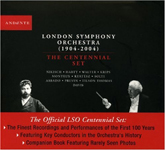| Record companies, artists and publicists are invited to submit CDs to be considered for review. Send to: Jerry Bowles, Editor, Sequenza 21, 340 W. 57th Street, 12B, New York, NY 10019 |
Latest Posts
Ernst Pepping and Allan Pettersson: Moral Dilemmas in Symphonic Music
"The numbers all go to eleven. Look, right across the board, eleven, eleven, eleven and... "
Tell the Birds
Soundtrack to an Apocalypse
Feast Your Ears: New Music for Piano
Gone For Foreign
Fred Lerdahl: Time After Time
Nothing Sacred
Two From Wayne Horvitz
Two Fresh Cantaloupes
Record companies, artists and publicists are invited to submit CDs to be considered for our Editor's Pick's of the month. Send to: Jerry Bowles, Editor, Sequenza 21, 340 W. 57th Street, 12B, New York, NY 10019



|
Archives
Saturday, December 18, 2004
Saturday, December 25, 2004
Friday, December 31, 2004
Wednesday, January 05, 2005
Monday, January 10, 2005
Thursday, January 13, 2005
Thursday, January 20, 2005
Sunday, January 23, 2005
Monday, January 24, 2005
Saturday, January 29, 2005
Wednesday, February 02, 2005
Thursday, February 03, 2005
Monday, February 07, 2005
Tuesday, February 08, 2005
Friday, February 11, 2005
Monday, February 14, 2005
Wednesday, February 16, 2005
Tuesday, February 22, 2005
Monday, February 28, 2005
Sunday, March 06, 2005
Monday, March 07, 2005
Wednesday, March 09, 2005
Sunday, March 13, 2005
Friday, March 18, 2005
Monday, March 28, 2005
Saturday, April 02, 2005
Monday, April 11, 2005
Sunday, April 17, 2005
Tuesday, April 19, 2005
Monday, April 25, 2005
Monday, May 02, 2005
Monday, May 09, 2005
Tuesday, May 17, 2005
Tuesday, May 31, 2005
Monday, June 06, 2005
Thursday, June 16, 2005
Sunday, June 19, 2005
Sunday, July 10, 2005
Wednesday, July 13, 2005
Sunday, July 24, 2005
Friday, July 29, 2005
Monday, August 08, 2005
Monday, August 22, 2005
Wednesday, August 24, 2005
Friday, September 16, 2005
Sunday, September 25, 2005
Tuesday, October 04, 2005
Tuesday, October 18, 2005
Monday, October 24, 2005
Tuesday, November 01, 2005
Monday, November 07, 2005
Saturday, November 12, 2005
Wednesday, November 16, 2005
Tuesday, November 29, 2005
Friday, December 16, 2005
Monday, January 09, 2006
Thursday, January 12, 2006
Thursday, January 19, 2006
Tuesday, January 24, 2006
Thursday, February 02, 2006
Monday, February 13, 2006
Wednesday, February 15, 2006
Wednesday, March 01, 2006
Sunday, March 19, 2006
Sunday, March 26, 2006
Friday, March 31, 2006
Sunday, April 09, 2006
Monday, April 10, 2006
Thursday, April 20, 2006
Friday, April 21, 2006
Thursday, May 11, 2006
Thursday, May 18, 2006
Saturday, May 20, 2006
Friday, June 02, 2006
Tuesday, June 06, 2006
Friday, June 16, 2006
Monday, June 19, 2006
Sunday, June 25, 2006
Monday, June 26, 2006
Monday, July 10, 2006
Thursday, July 13, 2006
Thursday, July 20, 2006
Friday, July 21, 2006
Sunday, July 23, 2006
Thursday, August 03, 2006
Wednesday, August 09, 2006

|
|
Friday, February 11, 2005
The London Symphony (1904-2004) - The Centennial Set
Andante
 Last year was the 100th anniverary of the founding of the London Symphony Orchestra which was born in 1904 as the UK’s first orchestra governed and managed by the players themselves. Last year was the 100th anniverary of the founding of the London Symphony Orchestra which was born in 1904 as the UK’s first orchestra governed and managed by the players themselves.
In a city where five major orchestras compete for fans and funds, the LSO is the current undisputed heavyweight champ, drawing big name conductors, adoring audiences and critical praise—much to the consternation of its rivals.
The story of the LSO’s long battle for survival and current acendancy is told in a recently published history, The LSO: A Century of Triumph and Turbulence, by Richard Morrison, a London critic.
As Morrison tells the tale, there was only one symphonic orchestra in London in 1904, the Queen's Hall Orchestra, directed by Henry Wood, the musical mind behind 'Mr Robert Newman's Promenade Concerts,' as the Proms were then known. Wood didn’t pay all that well and musicians would frequently rehearse with him but send unrehearsed deputies on the night of the concert because they had accepted better paying gigs with hotel or music hall bands.
When Wood tried to end this practice, his players revolted, and set up the London Symphony as what they called "something akin to a musical republic." Dedicated to maintaining the players' freedom to come and go, it was to be a self-governing, profit-sharing collective.
Under Hans Richter and then Edward Elgar, the orchestra prospered for a decade but ran into serious trouble by the late 1920s, managed to survive the arrival the BBC and World War II only to nearly die in the 1950s before a young, hip, mediagenic conductor named André Previn made it the hip ticket in London again. Under Previn, the LSO’s recording contracts and film work multipled and a huge middle-market was developed.
Over the past 20 years, the LSO has flourished under good management and entered its second century in better shape than ever. To mark the occasion, Andante has issued The London Symphony (1904-2004) - The Centennial Set, a box of four-CDs that brings together many of the great performances and conductors who have been part of the LSO’s long and distinguished history. The earliest performance is Weber’s Oberon Overture, led by Arthur Nikisch from 1914; the latest a 1999 performance of the Benvenuto Cellini overture led by Sir Colin Davis. Most of the great conductors and guest conductors in between are represented, including Bruno Walter, Claudio Abbado, Sir Hamilton Harty, Michael Tilson Thomas, István Kertész, Previn, Josef Krips, Georg Solti, and Pierre Monteux. The historical performances have all been digitally remastered and are surprisingly crisp. There is also a splendid booklet with some vintage photographs and first-hand accounts of performances by LSO musicians. Highly recommended.
posted by Jerry Bowles
12:06 AM
|
|




